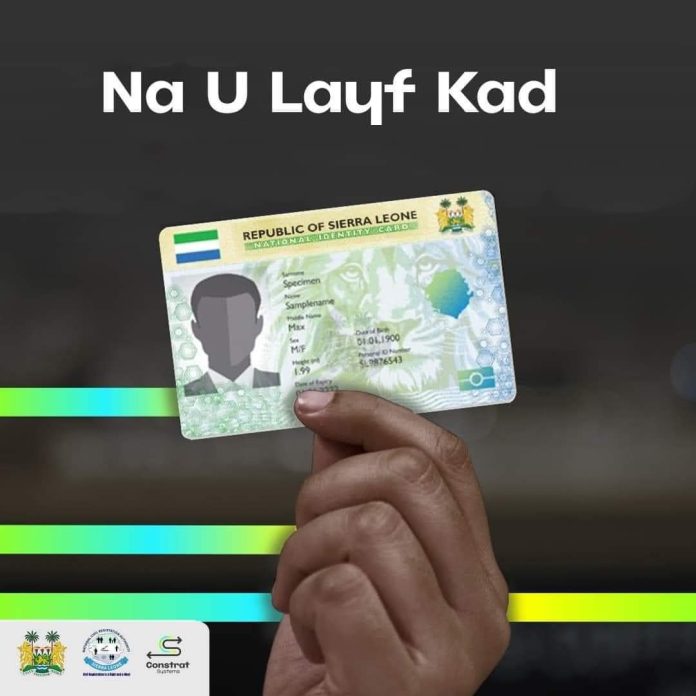By Amin Kef (Ranger)
The ongoing issuance of Biometric ID Cards to both citizens and non-citizens marks a pivotal milestone in Sierra Leone’s efforts to improve national security and establish an organized identity management system. These cards, a critical innovation by the National Civil Registration Authority (NCRA), are transforming how individuals access essential services and safeguarding against identity fraud nationwide.
The introduction of Biometric ID Cards is fundamentally reshaping security frameworks at both personal and national levels. Equipped with advanced biometric features, including fingerprints and facial recognition, these cards provide a tamper-proof system that makes identity theft and fraudulent activities increasingly difficult. By ensuring accurate identification for every individual, the cards bolster trust across sectors and contribute to a safer Sierra Leone.
In an era where identity fraud poses growing threats, especially in digital transactions, secure identification has become paramount. The Biometric ID Cards serve as an effective shield against such threats, protecting citizens, businesses and Government institutions from financial loss and reputational harm caused by fraud.
Beyond security, Biometric ID Cards have become indispensable for accessing a wide array of public and private services. Whether collecting remittances at Foreign Exchange Bureaus, opening bank accounts or cashing cheques, these cards streamline processes while ensuring identity verification.
Government institutions, such as the Ministry of Lands, now require Biometric IDs for applications related to land acquisition and other services. Similarly, students sitting for public examinations must present their cards to validate their identities, ensuring transparency and preventing impersonation.
In sectors like healthcare and social welfare, the Biometric ID Card simplifies identity verification, enabling seamless access to benefits and services. Its widespread adoption underscores its utility across various facets of daily life.
As part of the Government’s comprehensive strategy to enhance security and prevent fraud, all phone users in Sierra Leone are mandated to link their National Identification Numbers (NINs) to their mobile phone SIM cards. This statutory requirement seeks to tighten controls over communication networks and combat cybercrime, identity fraud and illegal activities conducted via unregistered phones.
By ensuring that every SIM card is linked to a verified Biometric ID, the initiative strengthens national security and supports efficient monitoring of communication channels. Non-compliance with this regulation will result in the suspension of mobile communication and transaction services, making compliance essential.
To meet growing demand, the NCRA has increased its registration services, with centers now operational in the following locations:
- Freetown Headquarters: 2 Walpole Street, Freetown
- King Harman Road Office: 23B Off King Harman Road, Freetown
- Lumley Road Office: Near the Roundabout, Freetown
- Waterloo Office: Opposite the Police Station, Freetown Highway
- Regional Offices: Bo, Kenema, Makeni, and Port Loko
For further information, residents can contact the NCRA through:
- Phone: +232-33-433-333 or +232-30-500-000
- Email: idverification@ncra.gov.sl
The NCRA’s rollout of Biometric ID Cards is more than an administrative exercise; it is a transformative step toward building a secure, organized and fraud-free society. Citizens and non-citizens are urged to prioritize obtaining their cards, not only to avoid service disruptions but also to contribute to Sierra Leone’s progress in identity management and digital security.
From preventing identity theft to enhancing access to services and fortifying communication networks, the Biometric ID Card is redefining national development. Its role in linking identities to SIM cards further exemplifies its significance in securing the country’s infrastructure.
As Sierra Leone embraces this forward-looking initiative, the Biometric ID Card stands as a symbol of resilience, innovation and the collective pursuit of a safer and more inclusive future.




